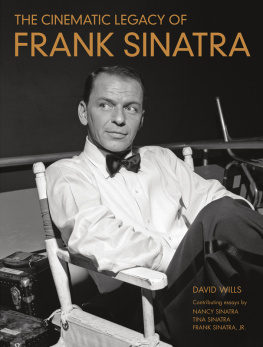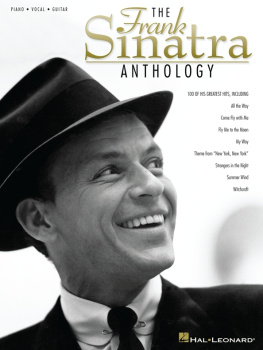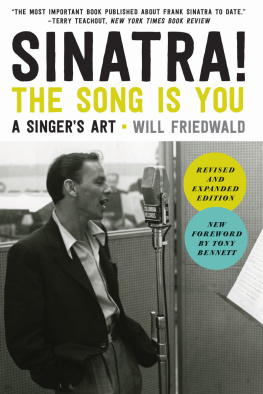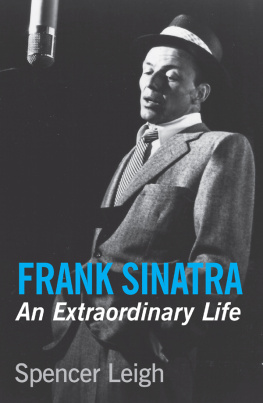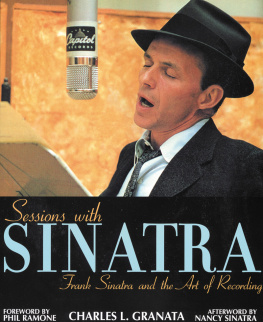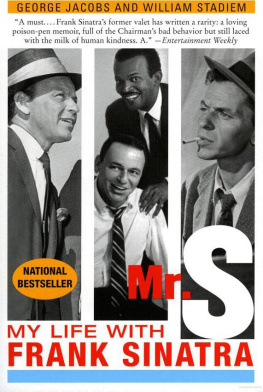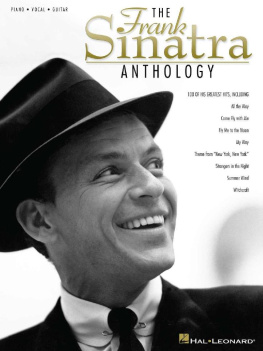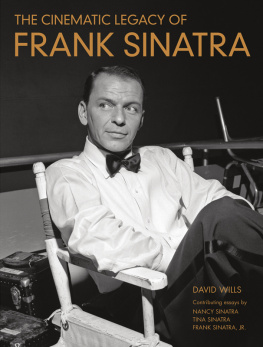Contents
Guide
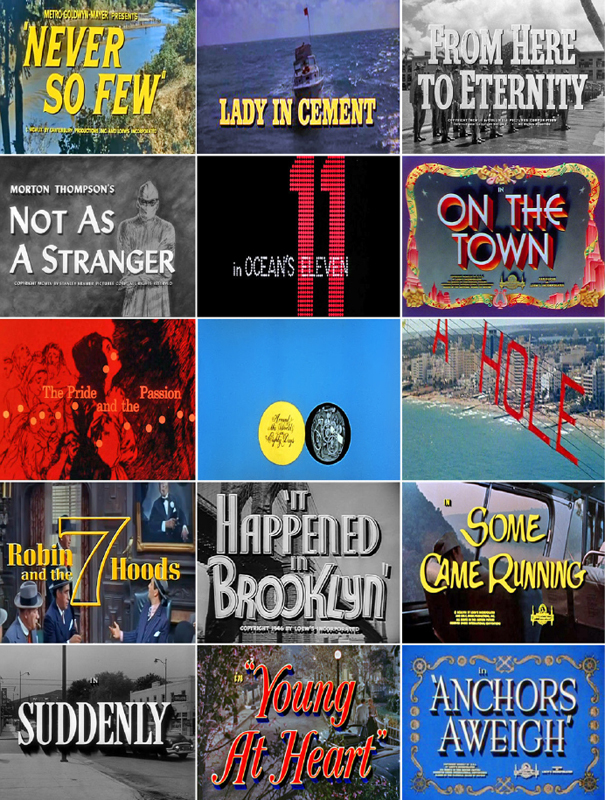
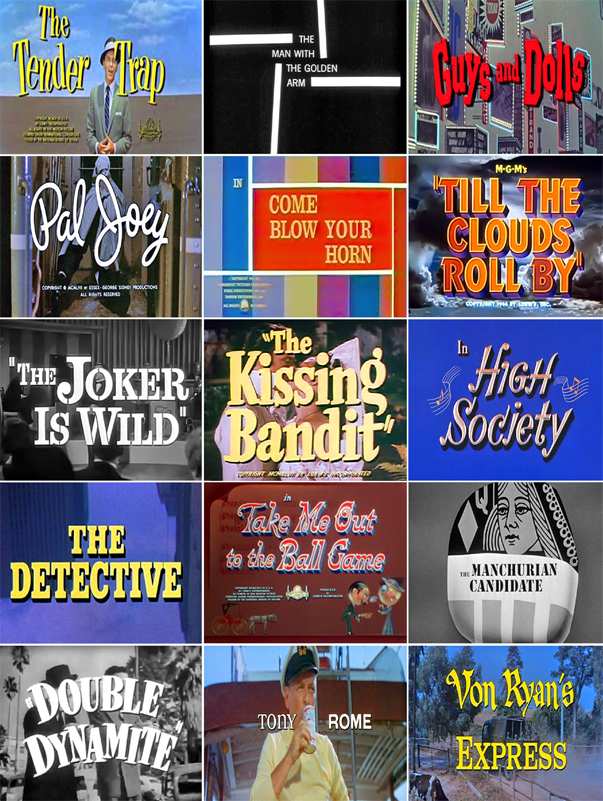
THE CINEMATIC LEGACY OF
FRANK SINATRA
DAVID WILLS
Contributing Essays by
NANCY SINATRA, TINA SINATRA and FRANK SINATRA, JR.
Contributing Photo Editor
AMANDA ERLINGER
Designed by
STEPHEN SCHMIDT

The author and publisher have provided this e-book to you for your personal use only. You may not make this e-book publicly available in any way. Copyright infringement is against the law. If you believe the copy of this e-book you are reading infringes on the authors copyright, please notify the publisher at: http://us.macmillanusa.com/piracy.

Film history is filled with stars created by the studio system. Carefully controlled, modified, costumed and trained, these performers often became much more than originally met the eye. Many had natural talent, some only charisma, and others great beauty. Occasionally, however, a performer emerged who, against all preconceived odds of what a star should be or look like, knocked down the walls of convention by becoming nothing other than what they already were. Frank Sinatra was the embodiment of this fundamental truth.
An entertainer who acted, an actor who produced, and finally a producer who also happened to be a world famous singer, Sinatra proved to be a roulette wheel of constantly spinning talent, the likes of which Hollywood rarely matched on its own. His was a singular talent so profound that for decades when faced with changing times and attitudes, Sinatra effortlessly reinvented himself to fit the new ideas of cool.
Sinatra, instantly identifiable by just his last name, is the definition of a true star: a person who possesses the elusive qualities of innate likeability, charisma, talent and personal magnetism.
Rarely, if ever, stopping to savor success, Sinatra bulldozed a career like no one elses. The legacy of his warp-speed life, work and leisure stand apart from many of his contemporaries, who were essentially fulfilling a highly specialized audience expectation, blown up and out for the big screen. Most of the great stars in cinematic historylike Cary Grant, Marilyn Monroe, John Wayne, Bette Davis or Charlie Chaplinbased their performances on an extension of a core character type. The downside to this was often typecasting. Sinatra, however, was able to take his signature persona and translate it successfully into many film genresfirst as the comedic song-and-dance man, then as the dramatic actor and romantic lead, and finally as the tough guy and action hero. He could do anything.
Sinatra also respectfully challenged contemporary ideals of acting technique. While being humble enough to learn from his peers, he kept his acting style fresh and instinctual, and earned an Oscar at a time when many actors were either classically trained or coached in the Method.
Sinatra, the smooth crooner, had an unhurried and meticulous way with a song. But as a movie star, he was in constant motion, an impatient actor in for a single take, maybe two. During the filming of Oceans 11 in 1960, Peter Lawford recalled, I remember once the soundman kept complaining about an unusual number of low-flying airplanes which he was picking up through his earphones, and which were consequently being heard on the track. Well, after about the fourth take, which was unheard of for Frank, he said, Aw, f it! Everyone knows theyre airplanes! Indeed! But flying through a bathroom? Despite the production being his project, his party, Sinatra couldnt take the wait, having already moved past the scene in his mind. Moviemaking was a snails pace process; Frank was rapid-fire, at his best when everyone else was just getting started.
Golden Boy
In 1941, on the assumption that the young singer might generate box office numbers to match record sales and concert grosses, Paramount propped Sinatra in front of the Tommy Dorsey Orchestra to sing Ill Never Smile Again in Las Vegas Nights. MGM following suit the next year with the song Moonlight Bay in Ship Ahoy, no acting required. Reveille with Beverly (1943) at RKO featured a performance of Night and Day, about which the films star, Ann Miller, recalled, A record would start to spin, then the camera would pan onto the record while the voice came on, and then to Franks face with a big band backing him. Even way back then he was great, his voice sent tingles up your spine.
That same year the singer spoke his first lines on screen, Good morning, Im Frank Sinatra, and played a version of himself in Higher and Higher. Crooning a few new songs selected just for him, he invited comparisons to Bing Crosby, his own idol, and received encouraging press about his screen potential. Physically, he had unlikely prospects for movie stardom, but was interestingly photogenic, with sharp cheekbones and large eyes to accompany The Voice.
A musicalization of the Marx Brothers Room Service, titled Step Lively, was released in 1944. Show business again the background, this time Frank played a character other than himself, a playwright named Glenn Russell. Sinatra was introduced to songwriters Sammy Cahn and Jule Styne, landed his first screen kiss (with Gloria DeHaven) and received top billing, a status that would come and go through the next decade.
Next up for Sinatra was joining the Navythe MGM Navyfor Anchors Aweigh (1945), which paired the best singer with the best dancer as two sailors on a four-day pass in Hollywood. Gene Kelly took on the task of putting Sinatra on his dancing feet, and very nearly succeeded. Sinatra, as wide-eyed puppy dog Clarence Dolittle, struggles to keep up with his buddy/idol, the wolfish Joe Brady, in lady-killing and toe-tapping, but sings I Fall in Love Too Easily to a Best Song Oscar nomination. Kathryn Grayson as Susan captures Clarences affections; she falls for Joe, Clarence ultimately hooking up with Pamela Britton, the girl from hometown Brooklyn. The story is so lightweight it could be done in by the slightest sea breeze, but Sinatra is endearing, continually adjusting the angle of his sailor cap to match Joes. There was some on-set trouble when Sinatra was vocal about his frustration with the sit-around-and-wait of moviemaking, as reported by columnist Louella Parsons, but his cast mates pledged their support to counter any future complaints.
MGM then placed Sinatra in a 1946 fictionalized movie portrait of composer Jerome Kern. Draped in a white tuxedo and backed by a white-wardrobed full orchestra, Sinatra performs Ol Man River on a cavernous white-washed set for the finale of Till the Clouds Roll By. The production number struck many wrong notes and was called into question by critics, and perhaps by Sinatra himself.
A modest black and white musical followed in 1947, It Happened in Brooklyn. A much more assured screen actor this time out, Sinatra plays Danny Miller, an aspiring singer returning from service in WWII. He is first paired with Kathryn Grayson, but is supplanted in her affections by Peter Lawford in what is essentially a replay of the

